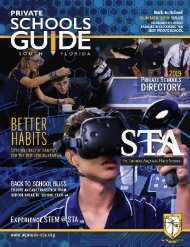You also want an ePaper? Increase the reach of your titles
YUMPU automatically turns print PDFs into web optimized ePapers that Google loves.
Reinforcing Social Skills While
Social D i s t a n c i n g
Many parents are expressing concern about their children's social development at a time when socializing
is limited. Understandably so since developing social skills is linked to success in school. But before they can
learn academics, children need to know how to interact with others, control and express their feelings, and
take care of basic tasks independently. Developing social skills prepares children for a lifetime of healthy
interactions in all aspects of life.
Social skills are the skills we use to communicate and
interact with others, both verbally and non-verbally.
They facilitate interactions through tone of voice,
volume of speech, body language, and gestures.
Social skills can be taught, practiced, and learned with
effort, and helping children refine these skills requires
a different set of strategies in each stage of their
development. This process of internalizing and learning
(or teaching) the norms and ideologies of society is
called socialization, and it is paramount for the overall
wellness of our community and culture. Many variables
can influence the development of social skills in children;
gender, birth rank, number of children in the family, and
whether they attend daycare or preschool all influence
social development. The pandemic has created yet
another challenge no one saw coming-social distancing.
How do you teach and practice these social skills when
social interaction is limited?
Although opportunities to be physically near others are
limited, opportunities for socializing are everywhere.
Because of the need for physical distancing, it does
require more effort than arranging a playdate, but with
an open mind and some outside-the-box thinking, you
can help your child keep working on their social skills.
Even while distancing, parents can continue to build on
these skills by filling the voids and looking for teachable
moments. For example, family members can be great
teachers for conflict resolution and negotiation.
Play is important work. For young children, playing is
how they learn to think, problem-solve, and investigate
the world. It is through play that children discover that
learning is fun and become enthusiastic lifelong
learners. Playing requires a lot of social
thinking skills, sharing, and turn-taking.
Take the opportunity and designate
at least one night of the week as a
game night with your family.
There are plenty of good
games you can buy that target critical social-emotional
learning skills. However, you may already have some
that actually require a lot of social thinking skills. Games
such as Apples to Apples (the way better and cleaner
version of the game Cards Against Humanity) requires
perspective-taking skills. It is a game in which players
take turns being the judge. The judge gives a one-word
prompt, and players have to pick from a set of cards in
their hand which one best matches the prompt based on
who is judging each round. Players have to think about
what they know about the judge to predict how they
will react and choose their favorite answer. It requires
turn-taking and encourages asking for clarification,
accepting/rejecting an idea, and accepting rejection.
Choose games that involve communicating, sharing,
and turn-taking. Talk your child through the steps of
tolerating frustration and rejection. A child that can
learn to lose gracefully will be a lifelong winner.
Perhaps as beneficial as play, reading is a great way
to teach children about different social situations,
empathy, and social problem-solving skills. Reading
is known to improve focus and concentration in
academics. That same focus is also essential to social
interaction. Children are not born with the ability to feel
empathy. They learn this skill through social interaction
with family, friends, and society. Some research has
shown that reading fiction can increase empathy by
putting the reader inside the mind of
another person. It allows the
reader to feel what the
character feels and understand their thoughts and
emotions. Reading immerses children in every emotion,
triumph, and adversity of their favorite characters. In
addition to learning empathy, books provide examples
of situations and social interactions that teach effective
– and ineffective – ways to handle conflict. It allows
children to experience a range of moods and emotions
in an environment that allows for space and time to
think about how they might react in a similar situation.
Start a family book club and talk about characters, what
they felt and how their actions affect other characters
in the story. Talk about different social situations and
encourage your child to share how they might react
similarly or differently.
You may be surprised to hear that television-when
used correctly-can also be a great tool to help children
understand emotions and behaviors. Explaining
sarcasm, irony, and humor may be difficult for them
to grasp, and understanding social cues take practice
for kids. Using television is a fun way to observe social
interactions that are often exaggerated to make a point.
Actively watch a show with your child and point out
social cues and appropriate behavior. Practice how
they read and respond to other people and explore
these interactions. Discuss empathy and talk about how
they might feel if faced with a similar situation. Children
that learn to associate certain words with emotions
can use those words to express their own feelings.
This transition from interpreting feelings to talking
about feelings can help them communicate
effectively and avoid acting out in frustration.
Television can be a tool that helps children
and adolescents better understand
themselves and others.
Continued on Page 8
2021 / SUMMER CAMP FUN l
5
















